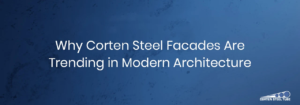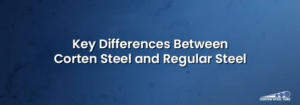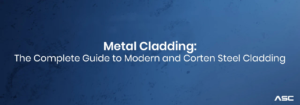Corten Weathering Steel FAQ's
What is Corten®?
Corten® refers to a type of weathering steel that exhibits enhanced corrosion resistance. It is a group of steel alloys designed to develop a rust-like appearance over time, creating a protective layer against atmospheric elements.
A588 OR A606-4?
A588 and A606-4 are both weathering steel specifications with similar chemical compositions meeting the ASTM G101 corrosion-resistance index of 6.0 or higher. The key distinctions between the two are:
A606-4:
- Considered weathering steel sheet.
- Available in thicknesses starting at 22 Gauge and going up to 3/16”.
- Stocked in flat sheets, coil, and panels.
A588:
- Available in steel plate form.
- Starts at a thickness of 3/16” and can go up to 5”.
- A high-strength low-alloy plate used for structural applications like buildings and bridges.
Both A606-4 and A588 come with dual Mill Certifications of ASTM A606-4 and ASTM A588 for thicknesses 14 Gauge and thicker, providing assurance of their quality and adherence to industry standards. These certifications verify that the materials meet the specified requirements for weathering steel.
Can A606-4/A588/A847 be welded?
Yes, A606-4, A588, and A847 can be welded using the appropriate welding procedures. It’s essential to use flux combinations that ensure the tensile strength of the deposited weld metal (welding rod or wire) is consistent with the tensile strength of the base metal (weathering steel). The typical tensile strength of weathering steel base metal is in the range of 68-78 KSI.
What is special about Corten steel?
Corten steel, also known as weathering steel or COR-TEN® steel, is special due to its unique weathering properties. It forms a protective rust-like appearance when exposed to the elements, creating a natural and distinctive aesthetic. This rust layer acts as a protective barrier, enhancing the steel’s resistance to atmospheric corrosion.
Is Corten steel expensive?
The cost of Corten steel can vary depending on factors such as the specific product, dimensions, and supplier. In some cases, Corten steel may be more expensive than traditional steel, but its longevity and distinctive characteristics often justify the investment, especially in architectural and outdoor applications where its weathered appearance is desired.
Is Corten steel rust proof?
While Corten steel is not entirely rust-proof, it does exhibit high resistance to atmospheric corrosion. The rust-like patina that forms on the surface serves as a protective layer, preventing further corrosion and eliminating the need for additional coatings. The weathering process contributes to Corten steel’s durability in outdoor environments.
What is the difference between Corten steel and regular steel?
The primary difference between Corten steel and regular steel lies in their composition and weathering characteristics. Corten steel is a high-strength, low-alloy steel with specific alloying elements like copper, chromium, and nickel. These elements enhance the steel’s weathering properties, leading to the development of a protective rust-like patina over time. Regular steel, on the other hand, lacks these alloying elements and does not exhibit the same natural weathering process. Corten steel’s unique appearance and increased resistance to atmospheric corrosion make it distinct from conventional steel.
What is the weakness of Corten steel?
While Corten steel is known for its weathering properties and corrosion resistance, it does have some weaknesses. One weakness is that the initial rust runoff may stain surrounding areas during the weathering process. Additionally, in environments with high chloride content, such as coastal areas with saltwater exposure, Corten steel may experience accelerated corrosion.
Is Corten steel heavy?
Corten steel has a density similar to other carbon steel alloys. It is not significantly heavier than regular steel. The weight of Corten steel depends on the specific product and its dimensions.
What is the lifespan of Corten steel?
The lifespan of Corten steel can vary based on environmental conditions and usage. In favorable conditions, Corten steel is known for its longevity and durability. It can last for several decades and, in some cases, even longer, thanks to the protective rust-like patina that forms over time.
Who invented Corten steel?
Corten steel was developed by the United States Steel Corporation in the 1930s. The steel was initially created for railroad coal wagons to address the need for a material with high resistance to corrosion. The name “Corten” is a blend of “corrosion resistance” and “tensile strength.”
Is Corten steel safe?
Corten steel is generally considered safe for various applications. The protective rust layer that forms on the surface acts as a barrier, preventing further corrosion and providing a level of protection. However, like any construction material, proper handling and installation practices should be followed to ensure safety. Additionally, any safety concerns specific to a project should be addressed in accordance with local building codes and regulations.
What is a cheaper alternative to Corten steel?
A more economical alternative to Corten steel is using regular carbon steel with protective coatings. Corten steel is known for its unique weathering properties, which contribute to its distinctive appearance. However, if the distinct rusted look is not a crucial aesthetic requirement, standard carbon steel with appropriate coatings can offer a cost-effective solution.
Regular carbon steel can be primed and painted with corrosion-resistant coatings to provide protection against atmospheric corrosion. This approach is often more budget-friendly than opting for Corten steel, making it a viable alternative for projects with cost considerations. Keep in mind that the appearance of the standard carbon steel with coatings may not mimic the natural weathered look of Corten steel.
How thick is Corten steel?
Corten steel is available in various thicknesses, and the appropriate thickness depends on the specific application and structural requirements of the project. Common thicknesses for Corten steel sheets and plates can range from 1.5 mm to several inches. For specific projects, it’s advisable to consult with the supplier or manufacturer to determine the optimal thickness based on structural and aesthetic considerations.
How do you identify Corten steel?
Identifying Corten steel visually can be challenging, especially when it is newly manufactured and hasn’t undergone the weathering process that forms the characteristic rusted appearance. However, over time, Corten steel develops a distinctive patina, transitioning from an initially silver color to a rusted orange-brown hue.
To identify Corten steel:
- Rusted Appearance: The most apparent characteristic of Corten steel is its rusted appearance, which develops naturally over time. The surface will have a weathered, orange-brown patina.
- Unique Texture: Corten steel often has a unique texture on its surface due to the weathering process. The rusted layer may have a rough texture, contributing to its distinct aesthetic.
- Weathering Over Time: If you observe the steel undergoing changes in color and texture over time, it is likely Corten steel. Newly manufactured Corten steel may not exhibit these characteristics until it undergoes the weathering process.
What ASTM is Corten?
Corten steel is often specified according to ASTM (American Society for Testing and Materials) standards. The primary ASTM specifications for Corten steel are: ASTM A588, A242, A606-4, A847 and A709-50W.
Is Corten steel galvanized?
No, Corten steel is not galvanized. Galvanization is a different process involving the application of a zinc coating to steel to provide corrosion resistance. Corten steel, on the other hand, relies on its composition and the development of a natural patina to protect it from atmospheric corrosion.
What are the different types of CorTen steel?
The original CorTen steel was ASTM A242, commonly referred to as Type 1 and Type 2, or CorTen A and CorTen B.

Why Corten Steel Facades Are Trending in Modern Architecture
Why Corten Steel Facades Are Trending in Modern Architecture In the ever-changing world of architecture, some materials don’t just emerge as quick trends – they become true game-changers. Corten steel, with its unique rusty look and tough feel, is definitely one of those materials that architects, developers and engineers are getting excited about. You’re seeing it

Key Differences Between Corten Steel and Regular Steel
Key Differences Between Corten Steel and Regular Steel Introduction: Material Selection for Performance and Value Choosing the right steel is fundamental in engineering, construction, and manufacturing. The decision between Corten steel (weathering steel) and regular steel (mild or carbon steel) directly impacts structural integrity, project lifespan, maintenance schedules and overall cost. For engineers specifying materials, procurement

Metal Cladding: The Complete Guide to Modern and Corten Steel Cladding
Metal Cladding: The Complete Guide to Modern and Corten Steel Cladding Metal cladding is a building technique that is used to cover and protect the exterior surfaces of buildings – typically to cover walls, roofs or facades with a layer of metal to form cladding. The cladding acts as a barrier against weather and other environmental

